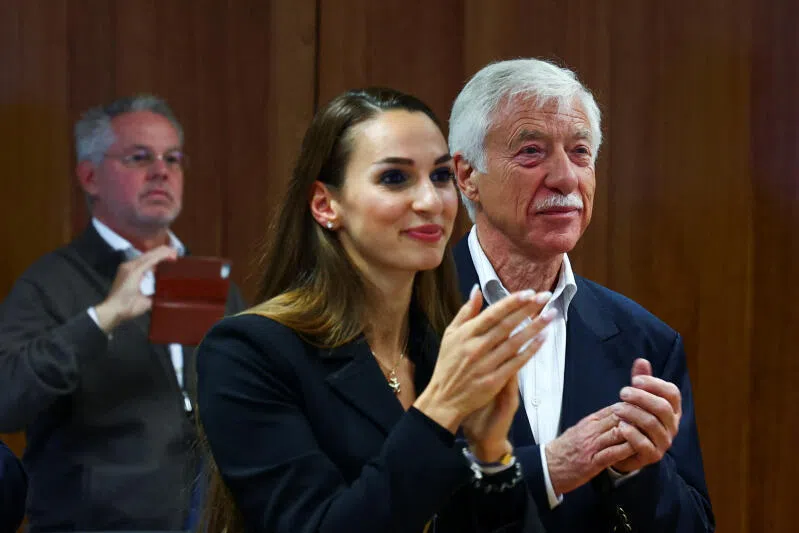Support for far-right triples in western German vote, show early forecasts
Sign up now: Get ST's newsletters delivered to your inbox

Alternative for Germany's Gelsenkirchen mayor candidate Norbert Emmerich (right) and Ms Enxhi Seli-Zacharias, from the same party, reacting to the exit polls for the North Rhine-Westphalian local election.
PHOTO: REUTERS
BERLIN – Support for Germany’s far right surged in local polls in the country’s most populous state on Sept 14, sending a warning to conservative Chancellor Friedrich Merz’s four-month-old national coalition with the Social Democrats, early projections showed.
Initial forecasts from pollster infratest dimap for broadcaster ARD after voting ended for councils, districts and mayors in the western state of North Rhine-Westphalia showed support for the Alternative for Germany (AfD) party had more than tripled to 16.5 per cent from 2020 levels.
Mr Merz’s conservatives remained the strongest party, scoring 34 per cent of the vote, roughly the same level as five years ago. The Social Democrats (SPD) slipped to 22.5 per cent from 24.3 per cent, according to infratest dimap.
“I am looking at the AfD’s results with great concern. This should give us pause for thought because this is a path that is emerging, and we democrats must counter it,” Mr Olaf Lies, SPD premier of the state of Lower Saxony told ARD TV.
North Rhine-Westphalia is home to nearly a quarter of Germany’s population. It covers a wide area from the Ruhr – Germany’s declining industrial heartland, which is seeking to shift away from coal mining and steel production – to cities such as Cologne and Duesseldorf, as well as large rural regions.
The vote is a first test for Mr Merz’s uneasy coalition with the SPD, which critics say is failing to tackle a sluggish economy and voter concerns about immigration.
Tackling migration is a priority for the nationalist AfD, which wants to spread its appeal to western Germany from its eastern strongholds.
A weekend Insa poll on Sept 14 put Mr Merz’s conservatives down one point and level with the AfD on 25 per cent nationally, while the SPD trailed in third place at 14 per cent.
“This is a great success for us,” said AfD co-leader Tino Chrupalla on social media platform X. “We are a people’s party, and we all bear a great responsibility for Germany.”
The AfD became Germany’s second-biggest party in February’s federal election and was endorsed by tech billionaire Elon Musk.
Germany’s domestic spy agency classified the AfD as a right-wing extremist organisation in May, although that decision is on ice pending a court appeal.
The initial forecasts in North Rhine-Westphalia showed heavy losses for the Greens and Free Democrats. Final results are not expected before Sept 15. REUTERS


